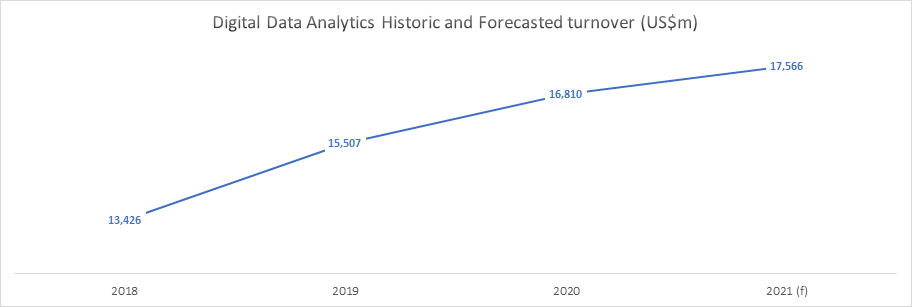The views presented here, along with those of a host of other industry leaders supported by detailed data on the industry’s segments, were included in ESOMAR´s Continued Evolution of the Data, Analytics and Insights Industry report for 2020. A look at the past, present and future of the industry, and an essential tool in the management’s toolbox, this report is available at esomar.org/evolution-of-insights.
ESOMAR’s collaborator Jackie Rousseau-Anderson interviewed Anouska Post, Senior RVP Sales EMEA at Salesforce, about the state of matters on the Insights Industry, with particular attention to the Digital Data Analytics segment (including the CRM, Martech and SaaS markets). Other interviews in this series include a take on Established Research, by Kantar’s Nathalie Burdet, one on Enterprise Feedback Systems by Fuel Cycle’s Eran Gilad and Rick Kelly, one on DIY Research Platforms by SurveyMonkey’s Tom Hale, and one on Consultancy Firms by McKinsey & Co.’s Tamara Charm and Candace Lun Plotkin.
Q. How would you categorize your company in the overall data and analytics industry?
A. Salesforce is the #1 CRM, bringing companies and customers together in the digital age. Founded in 1999, Salesforce enables companies of every size and industry to take advantage of powerful technologies—cloud, mobile, social, blockchain, voice, and artificial intelligence—to connect to their customers in a whole new way. They are coming to us as their trusted advisor, and together we are transforming their businesses around the customer. Salesforce Customer 360 is our vision for how we help customers with their digital transformations. It’s an integrated CRM platform that unites marketing, sales, commerce, service and more to give companies a single source of truth about their customers. It gives these teams a single, shared view of their customers so they can deliver the intelligent, personalized experiences their customers have come to expect from every brand and build lasting, trusted relationships.
Q. What would you say are some of the key trends you’re seeing in the industry right now?
A. I see two main trends. One is the enormous increase of the amount of data that companies have and how they use this to their benefit. It has become increasingly clear that the role of the CEO –if it wasn’t before– must also be their organization’s Chief Transformation or Digital Officer, leading the digitization of their business. CEOs are now re-imagining how they do business in this new digital world, making pivotal decisions on necessary business-wide transformation in days rather than months or even years. Whether they work in retail, travel, government, healthcare, or tech, their world has changed due to the COVID-19 pandemic. Companies must adapt to the new realities, business models must be re-examined, forecasts must be redone. This is then also the second trend I see: going digital is no longer an option but a necessity. The disruption of the COVID-19 pandemic has brought this into sharper relief; not only must CEOs digitally transform their businesses to survive – they must do so at scale and speed.
| Top-5 largest companies within the Digital Data Analytics segment | |||
|---|---|---|---|
| Ranking | Name | Headquarters | 2019 Turnover (US$m)* |
| 1 | Adobe Systems | San Jose, California, USA | 3,206 |
| 2 | Salesforce.com | San Francisco, California, USA | 2,506 |
| 3 | NICE Systems | Ra’anana, Israel | 793 |
| 4 | HubSpot | Cambridge, Massachusetts, USA | 675 |
| 5 | Oracle | Redwood Shores, California, USA | 574 |
* Only insights-related turnover
Source: ESOMAR’s Evolution of Insights 2020
Q. What, if any, are the key differences you’re seeing across global markets (if relevant)?
A. We see a big difference in markets such as America, EMEA and APAC. APAC, and mostly Asia, is a lot further than the rest of the world when it comes to digitization. Moreover, we see that Asia is very commercially focused, whereas America and EMEA also have a strong focus on giving back.
Q. Are there any particular clients in your client base that you think are at the forefront of the data/analytics industry? Any pushing you to up your game?
A. Industry wide I see a lot of interesting things happening. All industries are, however, at a different stage within their transformation. Within the financial services industry for example I see that data and machine learning is helping companies grow Salesforce systems to analyze data at scale, spot patterns and trends, and make automated predictions with more speed and accuracy than ever before. However, within retail I see retailers are really engaged with shoppers at every step of their journey. Consumer expectations are sky-high. Today’s shoppers expect individualized experiences whether they are shopping on their couch, on the go or in a store. Retail customers are more than willing to share their personal data if it means they will get better service. To meet the needs of today’s shoppers, retailers must deliver a personalized in-store journey blended with an online and mobile shopping journey.
Next to these – amongst others – interesting industries, you also see a difference in the size of companies and what they are focusing on. Enterprise organizations are responding to increased competitive threat by digitally transforming all aspects of their businesses. However, mid-market companies rely on digital transformation to fend off threats from small disruptors and compete with bigger rivals. Lastly, SMB companies are small, have less investment power and focus on growth.
All our customers of different sizes and in different industries are challenging us in their own way which is exactly what makes our work so interesting.

Source: ESOMAR’s Evolution of Insights 2020
Q. Why do clients choose you over your competitors?
A. Our clients choose us because we offer a total platform solution. On top of that, Salesforce has an incredible culture and ecosystem to which many people feel drawn to. Moreover, we always take an extra step for our customers or prospects; we customize demos for example and make sure we know their company from the inside and out.
Q. What is one thing clients say about working with you?
A. We have thousands of customers sharing their stories online from many different industries. Often, we hear back customers love the digital platform solution because it helps them to be more profitable or drive more impact. It aligns to their mission and therefore it’s more than just technology. They become part of our Salesforce Ohana. Ohana is a Hawaiian term meaning “family”. We love customers and treat them in the same way. That’s the way we like to change the world.
Q. What are some of the biggest changes in the industry you’ve seen in the last 3-5 years?
A. Over the last years we have seen all industries changing and their relationship with data. Therefore, platforms need to be smarter, faster and Artificial Intelligence (AI) is key for business success. By the end of 2024, 75% of enterprises will change from piloting to operationalizing AI, driving an enormous increase in streaming data and analytics infrastructures. Within the current pandemic context, AI techniques such as Machine Learning are providing vital insights and predictions about the spread of the virus and the effectiveness and impact of countermeasures.
Another trend we see is how organizations will have analysts practicing Decision Intelligence, including decision modeling. Decision intelligence is the discipline of turning information into better actions at any scale by model. Bringing the model “alive” it can predict business outcomes and human behavior.
This is leading into another trend called Graph Analytics. Graph Analytics are analytic tools used to determine strength and direction of relationships between objects in a graph. The focus of graph analytics is on pairwise relationship between two objects at a time and structural characteristics of the graph as a whole. This helped during the pandemic, to combine thousands of research papers, all kind of new sources, video’s, social media posts and clinical data to analyze and publish into (analytical) graphs to identify the correct actions in crises.
The last trend I like to share is Blockchain. Blockchain analysis is the process of inspecting, identifying, clustering, modeling and visually representing data on a cryptographic distributed ledger known as a blockchain. The goal of blockchain analysis is discovering useful information about the different actors transacting in cryptocurrency. Blockchain will change the Digital World!
About Anouska Post
Anouska Post is currently Regional Vice President Sales NGO at Salesforce and has been with the company since August 2014. Prior to Salesforce, Anouska held multiple managing roles at Cisco, leading up to Sales Engagement Manager North and Sales & Development Manager Emerging Markets. Anouska holds a bachelor’s in applied sciences in Human Resource Management from Hogeschool Rotterdam and a Master of Science in Change Management from University of Amsterdam.
Her passion is to help organizations to drive impact with technology. She is a mentor for young starters and has been involved as a volunteer in a series of projects such as Girls In IT and being on the ICT Nederland Woman Leadership Board. Anouska has received a number of honor and awards including Global Sales Leadership Recognition EMEAR Award and Innovation Award Woman in IT.

Senior RVP Sales EMEA
Salesforce


